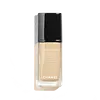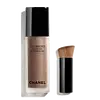What's inside
What's inside
 Key Ingredients
Key Ingredients

 Benefits
Benefits

 Concerns
Concerns

 Ingredients Side-by-side
Ingredients Side-by-side

Water
Skin ConditioningCaprylic/Capric Triglyceride
MaskingGlycerin
HumectantEthylhexyl Palmitate
EmollientRicinus Communis Seed Oil
MaskingUndecane
EmollientPolyglyceryl-3 PCA
EmollientPolyglyceryl-6 Polyhydroxystearate
EmulsifyingSynthetic Fluorphlogopite
Propylene Glycol
HumectantSilica
AbrasivePolyglyceryl-6 Polyricinoleate
EmulsifyingTridecane
PerfumingMagnesium Sulfate
Sodium Chloride
MaskingTerminalia Ferdinandiana Fruit Extract
AntioxidantGlycyrrhiza Glabra Root Extract
BleachingButylene Glycol
HumectantStearalkonium Hectorite
Gel FormingTocopheryl Acetate
AntioxidantParfum
MaskingPotassium Sorbate
PreservativeDisodium Stearoyl Glutamate
CleansingCaprylyl Glycol
EmollientPropylene Carbonate
SolventPentylene Glycol
Skin ConditioningLauroyl Lysine
Skin ConditioningSodium Hyaluronate
HumectantAluminum Hydroxide
EmollientLaminaria Digitata Extract
Skin ProtectingTocopherol
AntioxidantAscorbyl Palmitate
AntioxidantHelianthus Annuus Seed Oil
EmollientCI 77007
Cosmetic ColorantCI 77491
Cosmetic ColorantCI 77492
Cosmetic ColorantCI 77499
Cosmetic ColorantCI 77891
Cosmetic ColorantMica
Cosmetic ColorantWater, Caprylic/Capric Triglyceride, Glycerin, Ethylhexyl Palmitate, Ricinus Communis Seed Oil, Undecane, Polyglyceryl-3 PCA, Polyglyceryl-6 Polyhydroxystearate, Synthetic Fluorphlogopite, Propylene Glycol, Silica, Polyglyceryl-6 Polyricinoleate, Tridecane, Magnesium Sulfate, Sodium Chloride, Terminalia Ferdinandiana Fruit Extract, Glycyrrhiza Glabra Root Extract, Butylene Glycol, Stearalkonium Hectorite, Tocopheryl Acetate, Parfum, Potassium Sorbate, Disodium Stearoyl Glutamate, Caprylyl Glycol, Propylene Carbonate, Pentylene Glycol, Lauroyl Lysine, Sodium Hyaluronate, Aluminum Hydroxide, Laminaria Digitata Extract, Tocopherol, Ascorbyl Palmitate, Helianthus Annuus Seed Oil, CI 77007, CI 77491, CI 77492, CI 77499, CI 77891, Mica
Water
Skin ConditioningHydrogenated Polydecene
EmollientGlycerin
HumectantMethyl Gluceth-20
HumectantPEG-75
HumectantPentylene Glycol
Skin ConditioningOctyldodecanol
EmollientCitrus Aurantium Amara Flower Extract
RefreshingPhenoxyethanol
PreservativeButylene Glycol
HumectantPolyhydroxystearic Acid
EmulsifyingSodium Carbomer
Emulsion StabilisingDisteardimonium Hectorite
StabilisingTamarindus Indica Seed Gum
Emulsion StabilisingAluminum Hydroxide
EmollientPropylene Carbonate
SolventAmodimethicone
Disodium EDTA
Sodium Lauroyl Glutamate
Alcaligenes Polysaccharides
EmollientParfum
MaskingLysine
Skin ConditioningMagnesium Chloride
Ethylhexylglycerin
Skin ConditioningBHT
AntioxidantCI 77007
Cosmetic ColorantCI 77491
Cosmetic ColorantCI 77492
Cosmetic ColorantCI 77499
Cosmetic ColorantCI 77891
Cosmetic ColorantMica
Cosmetic ColorantWater, Hydrogenated Polydecene, Glycerin, Methyl Gluceth-20, PEG-75, Pentylene Glycol, Octyldodecanol, Citrus Aurantium Amara Flower Extract, Phenoxyethanol, Butylene Glycol, Polyhydroxystearic Acid, Sodium Carbomer, Disteardimonium Hectorite, Tamarindus Indica Seed Gum, Aluminum Hydroxide, Propylene Carbonate, Amodimethicone, Disodium EDTA, Sodium Lauroyl Glutamate, Alcaligenes Polysaccharides, Parfum, Lysine, Magnesium Chloride, Ethylhexylglycerin, BHT, CI 77007, CI 77491, CI 77492, CI 77499, CI 77891, Mica
 Reviews
Reviews

Ingredients Explained
These ingredients are found in both products.
Ingredients higher up in an ingredient list are typically present in a larger amount.
Aluminum Hydroxide is a form of aluminum. It can be naturally found in nature as the mineral gibbsite. In cosmetics, Aluminum Hydroxide is used as a colorant, pH adjuster, and absorbent.
As a colorant, Aluminum Hydroxide may add opacity, or reduce the transparency. Aluminum hydroxide is contains both basic and acidic properties.
According to manufacturers, this ingredient is an emollient and humectant. This means it helps hydrate the skin.
In medicine, this ingredient is used to help relieve heartburn and help heal ulcers.
There is currently no credible scientific evidence linking aluminum hydroxide in cosmetics to increased cancer risk.
Major health organizations allow the use of aluminum hydroxide in personal care products and have not flagged it as a carcinogenic risk at typical usage levels.
Learn more about Aluminum HydroxideButylene Glycol (or BG) is used within cosmetic products for a few different reasons:
Overall, Butylene Glycol is a safe and well-rounded ingredient that works well with other ingredients.
Though this ingredient works well with most skin types, some people with sensitive skin may experience a reaction such as allergic rashes, closed comedones, or itchiness.
Learn more about Butylene GlycolThis pigment is called Ultramarine blue lazurite. It gives a saturated blue color, but can be used to create other colors as well.
According to the manufacturer, it is usually made from kaolin, sodium sulfate, sodium carbonate, sulfur, and charcoal.
Ci 77491 is also hydrated iron III oxide. It's sole purpose is to give a red/pink hue to products.
Iron III oxides are classified as inorganic chemicals for coloring.
Synthetically created Ci 77491 is considered safer than those naturally found. This is because the synthetically created version may contain less impurities. Iron oxides are generally non-toxic and non-allergenic.
Learn more about CI 77491Ci 77492 is also hydrated iron III oxide. It's sole purpose is to give a yellow hue to products.
Iron III oxides are classified as inorganic chemicals for coloring.
Synthetically created Ci 77492 is considered safer than those naturally found. This is because the synthetically created version may contain less impurities. Iron oxides are generally non-toxic and non-allergenic.
Learn more about CI 77492Ci 77499 is also hydrated iron III oxide. It is created from mixing red and black iron oxides. This helps give shades of darkness to a product.
Iron III oxides are classified as inorganic chemicals for coloring.
Ci 77891 is a white pigment from Titanium dioxide. It is naturally found in minerals such as rutile and ilmenite.
It's main function is to add a white color to cosmetics. It can also be mixed with other colors to create different shades.
Ci 77891 is commonly found in sunscreens due to its ability to block UV rays.
Learn more about CI 77891Glycerin is already naturally found in your skin. It helps moisturize and protect your skin.
A study from 2016 found glycerin to be more effective as a humectant than AHAs and hyaluronic acid.
As a humectant, it helps the skin stay hydrated by pulling moisture to your skin. The low molecular weight of glycerin allows it to pull moisture into the deeper layers of your skin.
Hydrated skin improves your skin barrier; Your skin barrier helps protect against irritants and bacteria.
Glycerin has also been found to have antimicrobial and antiviral properties. Due to these properties, glycerin is often used in wound and burn treatments.
In cosmetics, glycerin is usually derived from plants such as soybean or palm. However, it can also be sourced from animals, such as tallow or animal fat.
This ingredient is organic, colorless, odorless, and non-toxic.
Glycerin is the name for this ingredient in American English. British English uses Glycerol/Glycerine.
Learn more about GlycerinMica is a naturally occurring mineral used to add shimmer and color in cosmetics. It can also help improve the texture of a product or give it an opaque, white/silver color.
Serecite is the name for very fine but ragged grains of mica.
This ingredient is often coated with metal oxides like titanium dioxide. Trace amounts of heavy metals may be found in mica, but these metals are not harmful in our personal products.
Mica has been used since prehistoric times throughout the world. Ancient Egyptian, Indian, Greek, Roman, Aztec, and Chinese civilizations have used mica.
Learn more about MicaParfum is a catch-all term for an ingredient or more that is used to give a scent to products.
Also called "fragrance", this ingredient can be a blend of hundreds of chemicals or plant oils. This means every product with "fragrance" or "parfum" in the ingredients list is a different mixture.
For instance, Habanolide is a proprietary trade name for a specific aroma chemical. When used as a fragrance ingredient in cosmetics, most aroma chemicals fall under the broad labeling category of “FRAGRANCE” or “PARFUM” according to EU and US regulations.
The term 'parfum' or 'fragrance' is not regulated in many countries. In many cases, it is up to the brand to define this term.
For instance, many brands choose to label themselves as "fragrance-free" because they are not using synthetic fragrances. However, their products may still contain ingredients such as essential oils that are considered a fragrance by INCI standards.
One example is Calendula flower extract. Calendula is an essential oil that still imparts a scent or 'fragrance'.
Depending on the blend, the ingredients in the mixture can cause allergies and sensitivities on the skin. Some ingredients that are known EU allergens include linalool and citronellol.
Parfum can also be used to mask or cover an unpleasant scent.
The bottom line is: not all fragrances/parfum/ingredients are created equally. If you are worried about fragrances, we recommend taking a closer look at an ingredient. And of course, we always recommend speaking with a professional.
Learn more about ParfumPentylene glycol is typically used within a product to thicken it. It also adds a smooth, soft, and moisturizing feel to the product. It is naturally found in plants such as sugar beets.
The hydrophilic trait of Pentylene Glycol makes it a humectant. As a humectant, Pentylene Glycol helps draw moisture from the air to your skin. This can help keep your skin hydrated.
This property also makes Pentylene Glycol a great texture enhancer. It can also help thicken or stabilize a product.
Pentylene Glycol also acts as a mild preservative and helps to keep a product microbe-free.
Some people may experience mild eye and skin irritation from Pentylene Glycol. We always recommend speaking with a professional about using this ingredient in your routine.
Pentylene Glycol has a low molecular weight and is part of the 1,2-glycol family.
Learn more about Pentylene GlycolThis ingredient is a solvent. It helps dissolve active ingredients and alter the texture of products.
Propylene Carbonate is commonly used in makeup and with clay, such as montmorillonite or bentonite.
Studies show this ingredient to be safe for cosmetics. When it is undiluted, it can cause skin irritation. (It is always diluted in skincare and makeup). This ingredient is water-soluble.
Propylene Carbonate is created from propylene glycol and carbonic acid.
Learn more about Propylene CarbonateWater. It's the most common cosmetic ingredient of all. You'll usually see it at the top of ingredient lists, meaning that it makes up the largest part of the product.
So why is it so popular? Water most often acts as a solvent - this means that it helps dissolve other ingredients into the formulation.
You'll also recognize water as that liquid we all need to stay alive. If you see this, drink a glass of water. Stay hydrated!
Learn more about Water